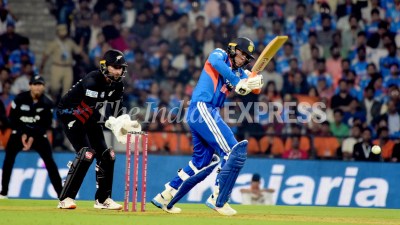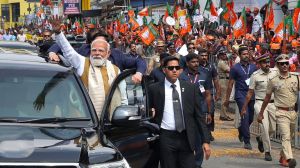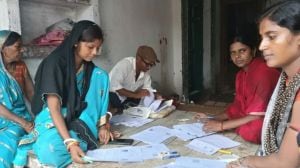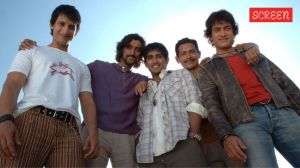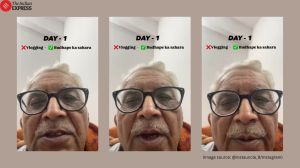As Jhelum courses down
Before the violence, four by-elections showed a politically maturing Kashmir

Four seats of the Jammu and Kashmir assembly were contested and won on April 24, 2006. Of these, all apart from the Bhaderwah seat, won handsomely by Chief Minister Ghulam Nabi Azad of the Congress, fall in the Kashmir region. So what, the reader will ask. There have been many elections in J038;K. Plus, a few days later, there was yet another attack on civilians. But it is my belief that slowly, silently as the Jhelum courses in winding loops through that once radiant Valley towards its merger with the mighty Indus, the election just concluded surely marks another curve towards a restoration of that radiance. How?
The message from the election has been analysed by many who claim inside knowledge. They have been lauded as a move towards normalcy, a demonstration of successful building of political alliance and of support bases of political parties. All these are true. But only a very few have put their finger close to how that message must be read.
To start with a few statistics: Rafiabad won by PDP8217;s Dillawar Mir saw a voter turnout of 66 per cent, and Bhaderwah 76 per cent. The turnout in Sangrama was 43 per cent, up 20 per cent from when the constituency last went to the polls. Pattan was 56.27 per cent. The highest ever turnout for an authentic election in the state was 67.7 per cent in the 1977 assembly elections, won convincingly by Sheikh Abdullah8217;s National Conference pitted against the Janata Party ruling at the Centre, which was in alliance among others with the Awami Action Committee of Mirwaiz Farooq father of the present Mirwaiz and the Jamaat Islami led by Syed Ali Shah Geelani.
One reads of complaints by the PDP leadership, even the Mufti himself, that the drubbing the party received in April was the result of a lack of support from the Congress. This may be true. The single seat won by the PDP was a result more of Dillawar Mir8217;s own standing rather than any lure of the PDP manifesto. But if this is indeed so, it will be the first time in the state8217;s history that the support of a national party or the lack of it actually determined the final verdict in an election. This potential had become dimly perceptible even as the state moved towards the 2002 assembly elections, in which the Congress actually won several seats in the Valley. But that was at the time construed simply as a result of anti-incumbency. But this has been substantiated in this election, a triumph for a party that did not even contest any of the three seats. It would be well for the political leadership of the state to mull this. There has been some disenchantment with the local political leadership, but given the other conclusion that follows here, such a view needs closer examination.
My own view is that the manner of ensuring the reaching of sanctioned relief to the needy after the recent quake that devastated the border areas and led to damages though no loss of life as far into the valley as Sangrama, dispensed under the Congress-led government, has had a telling effect on political support structures in the Valley. This has been further reinforced by the personal concern demonstrated by the national political leadership. The myth that the state government should not be led by a non-Kashmiri stands discredited. The Congress party is today a player in the politics of Kashmir similar to what it has been in the past in that of Jammu and Ladakh.
One conclusion that some have drawn from this election is that the bid to exploit support for Pakistan has failed to stir public support as it has done in the past. One eminent columnist has even gone so far as to suggest that Sheikh Abdullah and his principal aide Mirza Afzal Beig won the election of 1977 by flourishing Pakistani symbols and green hankies! I was deputy commissioner of Srinagar at the time. This was a complaint made to me with repeated insistence. I found the complaint unfounded. But yes, the Sheikh had promised that he would see the Srinagar-Muzaffarabad road reopened were he elected, a promise which has found fruition only now. And it was Prime Minister Morarji Desai who addressed a public meeting during his campaign at Srinagar8217;s Polo Ground, from a stage festooned with the slogan in Urdu: 8220;Only a strong Pakistan can ensure a strong India.8221;
I have dwelt on this to demonstrate how then, as now, separatist sentiment in J038;K could never be equated with a desire to be part of Pakistan. The evidence for this lies in the fact that parties overtly supporting Pakistan have never commanded the support of the people. To therefore read the failure of such an appeal to strike a chord in the present election and the presumption that goes with it is a potentially dangerous conclusion. But admittedly, Sangrama is among those few pockets where support for Pakistan has been strong. The turnout here and the verdict, with the son of an assassinated minister of the PDP government winning and polling in fact increasing after the blast at Palhalan both here and in Pattan does carry the message that the public is looking for more than mere rhetoric.
The results of the election, particularly the victory of Mustafa Kemal at Pattan, over the hitherto unvanquishable Syed Iftikhar Ansari, sets at rest another myth, that the National Conference only won elections because of low voter turnouts, and was not therefore a true representative of the people. It is true that statewide voter turnout in the 1996 election which brought the NC to power after bleak years of governor8217;s rule was 35 per cent, with the Valley averaging just over 20 per cent. Even in the assembly elections of 2002, NC victories were from constituencies with a low voter turnout. The election of 2006 then re-establishes the NC, the only party with a committed field cadre, as the principal local political entity in the Valley.
The by-elections of April 2006 were on the face of it a minor event. However, as the state moves further in its quest for peace with dignity for its people, the restoration of which the prime minister stated in his opening remarks in the first Round Table held in New Delhi to be a prime objective of his government8217;s policy in that state today, the flowering of each petal of democracy will surely one day lead to its full bloom. April 24 was such a petal.
The writer is central information commissioner and earlier served in J038;K wajahathabibullahnic.in
- 01
- 02
- 03
- 04
- 05


